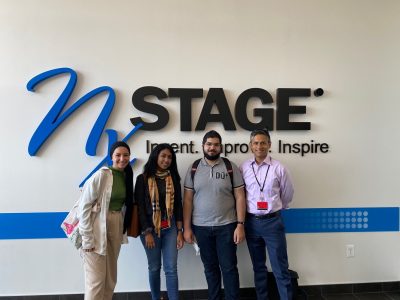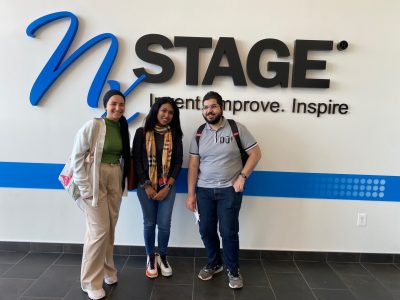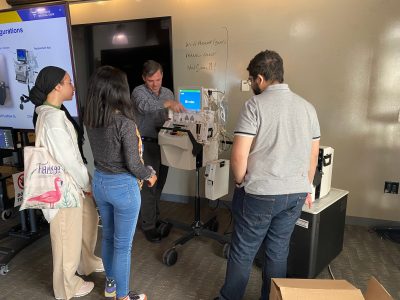Kidney Technology Research
Welcome to Boston University Kidney and Medical Engineering Program
(BU-KIDMEP)
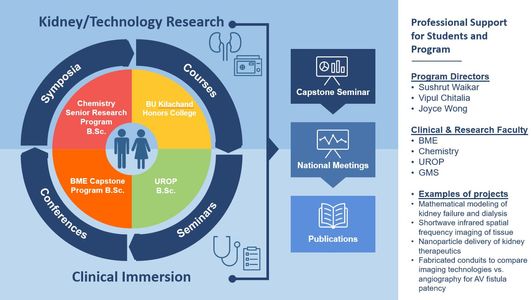
What is BU-KIDMEP?
This R25-grant supports undergraduate students to pursue engineering topics relevant to kidney diseases. Participating students will enroll in a summer clinical immersion program ($5,000 stipend) and a semester- or year-long program focused on technology development. Students can also be involved in longitudinal clinical immersion to understand kidney disease from the perspectives of patients and their care providers.
How common is kidney disease?
Approximately 10% of the US population has chronic kidney disease. Kidney failure requiring transplantation or dialysis affects over ½ million Americans and millions more around the world.
What types of projects are supported?
BU-KIDMEP will support any project related to technologies to help patients with kidney failure. This could include diagnostic testing, dialysis technology, medication delivery, or human systems engineering.
How do I apply?
Online application form is available here.
What kind of clinical immersion and didactic trainings will occur in the summer?
Here is calendar screenshot from our BU KIDMEP summer 2023 schedule:
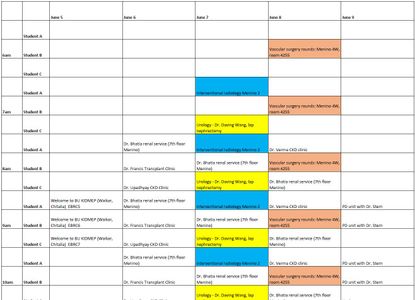
What are some of the clinical experiences available in summer program and beyond?
Students will join nephrologists and trainees on rounds in the hospital. Students will be able to see patients receiving hemodialysis, continuous veno-venous hemofiltration, and peritoneal dialysis. Students will also attend outpatient clinics where nephrologists take care of patients with kidney diseases and kidney transplants.
Last summer, students observed kidney biopsy procedures, urological surgeries, and vascular surgeries in the operating room. They also visited the outpatient dialysis unit and saw the inner workings of the technologies used in hemodialysis, including the hemodialysis water treatment systems that allow for the use of municipal water in treating patients on hemodialysis. Students visited the peritoneal dialysis center and learned about home dialysis technologies, which will likely be a major emphasis in the care of patients with kidney failure in the future. We also visited the headquarters of NxStage Medical Inc., to introduce students to biomedical engineers working at the cutting edge of dialysis technologies.
Here is a description of some of the clinical experiences you might have:
- Kidney biopsy procedure: This fundamental aspect of nephrology care for kidney disease diagnosis would be particularly appropriate for Biomedical Engineering students working on a project related to improvement of the kidney biopsy needle gun. Students researching kidney tissue interrogation using elastic light scattering may also benefit from observing a kidney biopsy in real-time to observe how their technology can be integrated at the bed-side to obtain a rapid estimate of chronic injury in kidney tissue.
- Interventional nephrology procedures: Vascular access is literally a lifeline for patients with ESRD on HD. Procedure such as angioplasty, tunneled dialysis catheter placement, and de-clotting of AV grafts all utilize technologies that may be of interest to biomedical engineers.
- Critical care nephrology rounds: Continuous veno-venous hemofiltration and -hemodialysis are continuous modalities for kidney failure that are used in critically ill patients. The technological challenges of continuous therapies are distinct from intermittent hemodialysis.
- Point of care ultrasound: The stethoscope of the future may be a portable ultrasound machine. The Boston University Internal Medicine Residency program teaches residents on the use of point of care ultrasound. Interested students could join these sessions, particularly for those whose projects may involve handheld device development.
- Da Vinci robot assisted total nephrectomy: In some cases, surgeons at BMC remove an entire kidney with the assistance of the Da Vinci robot. This provides support to the surgeon to identify, hold, and remove the kidney more quickly and efficiently, avoiding complications.
What kinds of projects are available?
We encourage students to identify a BU engineering mentor and a BMC nephrology mentor who can provide guidance on technology-related projects. Ideally, your summer experience will lead to a group senior design project focused on kidney disesae.
Here is a description of projects and mentors chosen by some of our summer 2021 students for their senior design projects:
- Professor Darren Roblyer in Biomedical Engineering: the student is developing a shortwave infrared (SWIR) detector for the non-invasive determination of body water content during hemodialysis. She made phantoms of lipid particles to generate their profile. Along with a PhD candidate, she also improved the design of the probe. This work was included in an NIH R21 grant that is likely to receive funding.
- Professor Irving Bigio in Biomedical Engineering: the student is working on elastic scattering spectroscopy (ESS) as a method of tissue fibrosis characterization. This student fabricated a new probe to perform intra-organ ESS determination. Along with a postdoctoral fellow, she completed an experiment in a rat model and is currently analyzing the ESS spectrum to detect early changes of fibrosis in deep medulla of rat kidneys.
- Professor Catherine Klapperich in Biomedical Engineering: the student is working on a team project that aims to develop a lower-cost point of care creatinine assay using the Jaffe method. If successful, this device could be used in the developing world to improve diagnosis of kidney disease, which is becoming increasingly common around the world.
How can I hear more about the experience of participating in BU-KIDMEP?
Hear testimonials from students in the video playlist below. For further questions, please email Dr. Sushrut Waikar.
